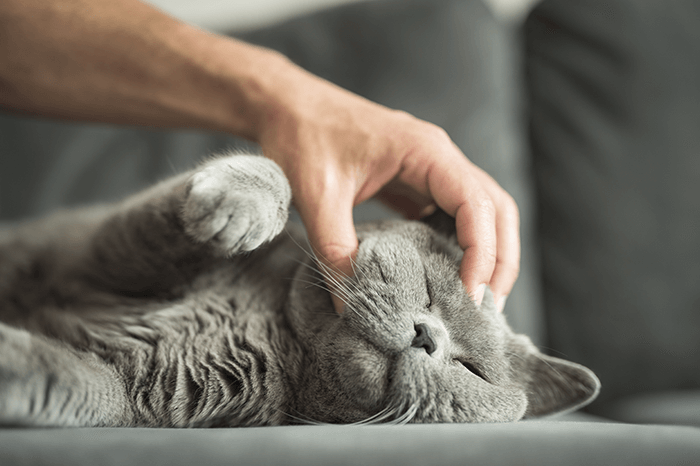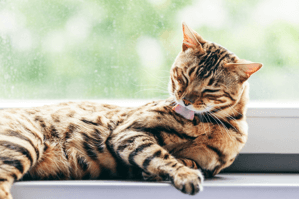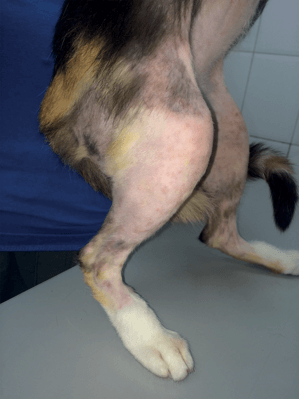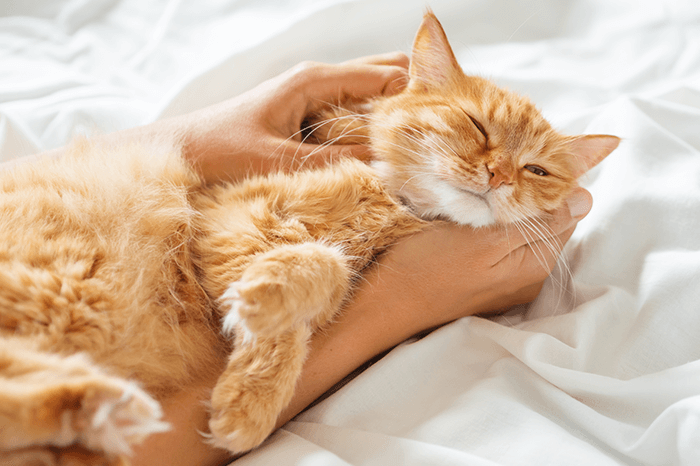Is your cat’s skin itchy?
Marina G VeterinarianItch is a very common sign in cats, even if it is often not as obvious as in dogs as one of the main manifestation is excessive licking. In this case, your cat will just spend more time grooming than usual. Keep an eye on your cat is the best way to know when something is wrong.
Does this sound familiar? You’ve noticed that your cat spends a lot of time scratching, licking, biting or grooming its skin and fur. It’s gotten to the point where your pet is quite distressed over this, and you don’t know what to do.
Itchy skin (also known as pruritus) is a very common sign that something might be affecting your cat’s health. Unfortunately, it’s also not specific for any particular illness, which means that diagnosing and treating the underlying cause can be challenging.
How can you tell if your cat is feeling itchy?
We’ve all seen our cats scratching from time to time, so how can you tell when their skin is really itchy and causing them discomfort? Some of the signs to keep an eye out for include:
- Scratching more than normal – if you notice your cat scratching regularly and not just once or twice, it’s a sign of a problem
- Over-grooming/pulling at their fur
- Excessively rubbing their faces or bodies against objects (more so than normal)
- Chewing or biting at their skin or coat
- Bald areas (hair loss)
What causes itchy skin in cats?
There are many causes for itchy skin, some quite evident like fleas or ticks and others that stem from illnesses elsewhere in the body.
Some of the most common causes for itchy skin are:
External parasites such as fleas and mites
Infestations by fleas are the most common causes of itchy skin in cats, but they are not the only parasites that can get overly friendly with your cats’ skin.
Mites, mosquitos, and flies can also cause distress and cause irritation though they are generally less common. Mites, such as Cheyletiella, also known as walking dandruff, can be harder to treat than fleas, and some species of mites responsible for sarcoptic mange, can jump from cats to people or parasites responsible of demodicosis.
Infestations by fleas are the most common causes of itchy skin in cats, but they are not the only parasites that can get overly friendly with your cats’ skin.
Mites, mosquitos, and flies can also cause distress and cause irritation though they are generally less common. Mites, such as Cheyletiella, also known as walking dandruff, can be harder to treat than fleas, and some species of mites responsible for sarcoptic mange, can jump from cats to people or parasites responsible of demodicosis.
In any case, keep your cat up-to-date on preventative treatment is the best way to prevent and treat parasite infestations. For this, make sure you follow the manufacturer’s recommendations, treat all the pets in the houseold, and treat the environment if you’ve seen external parasites.
Allergies, a common disease in cats
Cats can suffer from allergies just as we can, and it can cause very itchy skin. Allergies in cats can include:
- Flea allergy dermatitis (FAD) – where a cat is allergic to an allergen present in flea saliva, all it takes is one bite to trigger a reaction and cause severe itchiness.
- Food allergies – caused by an allergy to an ingredient found in a cat’s diet, for example chicken, lamb, beef, dairy products and wheat.
- Atopic dermatitis – an allergy to something in the cat’s environment, such as pollens, grass, house dust mites etc.
Allergic reactions can have numerous causes and have a whole host of other symptoms beyond itchy skin.
These causes can overlap, meaning your cat can have a food allergy and atopic (environmental) allergies at the same time.
Skin infections
Infections in the skin can be caused by a diverse array of organisms, and a large part of the time, they are secondary to an underlying problem or can occur secondarily to self-inflicted lesions linked to itch.
This means that infections, be it bacterial or otherwise, are often a consequence of a weakened immune environment in the skin as broken and injured skin is easily infected.
Fungal infections such as ringworm can cause hair loss (alopecia) in cats and crusty, reddened skin (sometimes circular in shape), although itch is highly variable.
Contact with skin irritants
Accidents happen! If you spot your cat scratching like mad suddenly, it’s worthwhile investigating if it came into contact with something that might be irritating to the skin, such as household cleaners or other products.
Call your vet as soon as you’re able, as many products can be dangerous for your cat in large quantities or if they linger on the skin for too long. If you know what it got into, keep that information on hand as you talk to your vet.
Psychogenic alopecia
This is an emotional problem in cats that are anxious for some reason, and not actually a cat that is itchy. However, many of the signs may seem the same, for example, overgrooming and hair pulling, causing patches of hair loss or even broken hairs. Diagnosis of psychogenic alopecia is through elimination of other causes and assessing the cat’s home situation and any potential causes of stress.
What can you do to help your cat?
When faced with itchy cat syndrome, the first thing that springs to mind is: will this go away?
The causes of pruritus are very varied and, as such, so is the answer to this question. The good news is that, in general, itchy skin will go away with proper treatment or, at least, it is possible to control it adequately.
Depending on the cause, solving itchy skin can be as easy as using flea treatment at regular intervals. However, some causes are difficult to diagnose and treat, making this process much harder.
Seek veterinary help
The most important step is to talk to your vet without delay. They will perform all of the necessary tests and will be able to pinpoint the underlying issue that is causing itchy skin to be a problem for your cat.
Complex skin problems can feel overwhelming, especially when caused by allergic reactions or by a hidden issue elsewhere on the body. Diagnosis is usually a multistep process, and treatment will, in some cases, be for life.
Trust your vet team and talk to them about your concerns or difficulties. There are many options available, and your cat is not likely to be the first pet to not take well to some parts of the treatment!
Keep accurate records
To help arrive at the correct cause as quickly as possible, keep good records of how this situation has progressed, including:
- When did it start?
- How did you notice it?
- Is this the first time it has happened?
- Where can your cat go?
- Is there a chance your pet has ingested or come into contact with something dangerous?
- Does it have any other health conditions?
- Is your cat on any medication at the moment?
- Is their flea and tick treatment up to date?
- Are there any more pets in the house?
It’s tempting to think that itchy skin will solve itself, but if you’re here, it’s because you’ve noticed your feline friend is not feeling so well, and their scratching is causing them distress. If untreated, wounds will likely appear, and with them, the chances of secondary infections skyrocket.
What might have been a pretty straightforward situation can quickly ramp up to a complex, much more damaging illness.
Be patient and stick to the treatment plan for as long as needed
The list of issues that cause itchy skin and need time-consuming treatments is long. This is why you must follow the plan set by your vet as closely as possible! Otherwise, you might have to take steps back or even start over altogether. Depending on the cause, this could be a plan for the life of your cat.
Bring quick relief from symptoms
Beyond treating any underlying conditions your cat might have and that can take time, itchy skin has to be managed quickly to avoid further skin damage. This can be achieved through several solutions, including using topical products to bring soothing and repairing ingredients where it is necessary. Depending on the situation, your vet may prescribe oral or injectable medication to alleviate itch. DOUXO® S3 CALM line was formulated to soothe itchiness, strengthen the damaged barrier and restore the balance of the flora. It comes in a wide variety of formulations, so you can avoid stressful baths. In case of skin infection, your vet may recommend using antiseptic products such as DOUXO® S3 PYO line.
Prevent from further damage
Cat's lesions won’t heal if it keeps scratching at it or grooming over it, so it is crucial to stop the cat from reaching the damaged skin.
We know cats are not fans of bodysuits or e-collars, but keep in mind that a few minutes of licking a hot spot can easily ruin all the progress achieved and that is situation won’t last more than a couple of days.

















